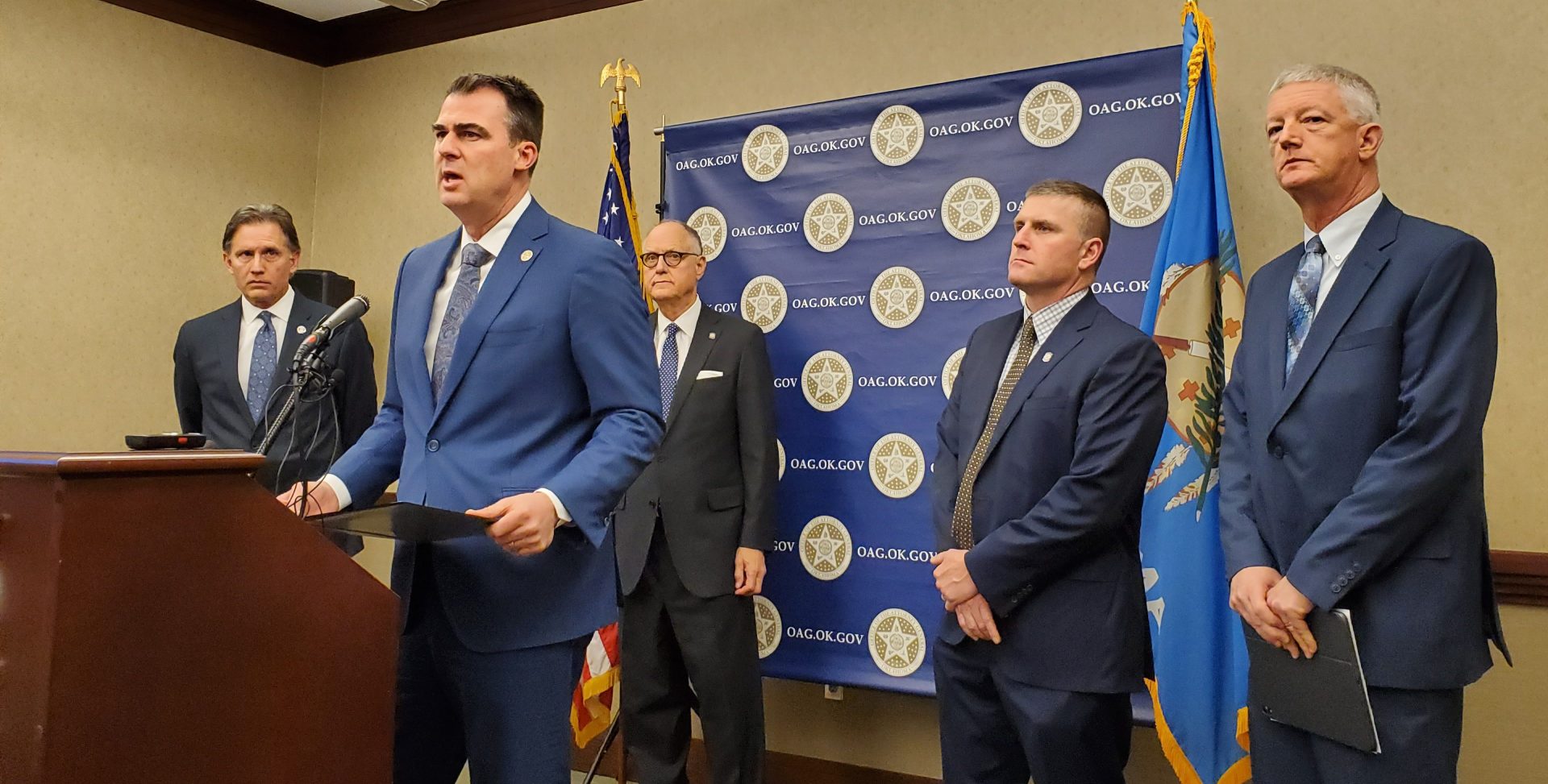
Gov. Kevin Stitt, Attorney General Mike Hunter and Department of Corrections Director Scott Crow say new rules will prevent mistakes during future executions.
Quinton Chandler / StateImpact Oklahoma


Gov. Kevin Stitt, Attorney General Mike Hunter and Department of Corrections Director Scott Crow say new rules will prevent mistakes during future executions.
Quinton Chandler / StateImpact Oklahoma
There’s a possibility state supplies of sedatives, paralytics and other drugs could be useful in the fight against the Covid-19 pandemic.
A group of doctors and pharmacists from around the country wrote a letter asking death penalty states to share drugs like midazolam, vecuronium bromide and fentanyl with hospitals treating Covid-19 patients.
#BREAKING Today, a group of physicians & med experts wrote an open letter to death penalty states asking them to give up their execution drugs: Doctors need them to treat COVID patients on ventilators as sedatives & paralytics – sometimes used in executions – are running short. pic.twitter.com/xHXblVPjsj
— Keri Blakinger (@keribla) April 9, 2020
Demand for the drugs has ballooned due to the pandemic and hospitals are facing a shortage.
The doctors say over 100 patients could be treated with drugs held by states that make their lethal injection stockpiles public. They believe hundreds more could be treated with drugs held by other states, but that’s hard to prove. Many states hide how many vials of the drugs they have along with other details surrounding executions.
States use a variety of drugs in their lethal injection protocols. Many, including Oklahoma, have adopted sedatives such as midazolam to subdue death row prisoners during executions. Oklahoma also uses vecuronium bromide, to relax prisoners’ muscles.
But, those drugs originally were intended to serve medical purposes. Doctors say the drugs can help sedate Covid-19 patients before they’re intubated and connected to ventilators.
Dr. Joel Zivot, Associate Professor of Anesthesiology and Surgery at Emory University in Atlanta is an outspoken critic of using drugs created for medical procedures in executions.
He helped write the letter and confirmed the Oklahoma Department of Corrections director and Gov. Kevin Stitt were sent copies.
“If states have execution drugs, or rather drugs … that in my hand are for the purposes of healing and in their hand are for the purposes of killing … I respectfully ask that you hand them over,” Zivot said.
But, the drugs are extremely valuable to states that continue to pursue executions.
In recent years, death penalty states – including Oklahoma – have struggled to find a supplier as multiple sources refused to share the pharmaceutical drugs with them.
Gov. Kevin Stitt, Attorney General Mike Hunter and Department of Corrections Director Scott Crow announced in February the state had finally found a fresh source and they intended to pursue new executions as soon as possible.
Because of two botched executions, a near third and a scarcity of drugs, the state was forced to forgo executions for about five years.
Citing state law that allows Oklahoma to shroud its drugs in secrecy, state leaders have refused to divulge the size of the new supply.
It’s unclear how long the drugs would last if executions resume or if the state were to share them in the fight against Covid-19.
Asked whether he could be using the pandemic as an opportunity to attack the death penalty, Dr. Zivot said he is not trying to “grind any axe about the rightness or wrongness of capital punishment.”
“My position is that medicine is medicine and punishment is punishment. I am not an expert in punishment, I’m an expert in medicine,” Zivot said.
The doctor wants states to leave medicine out of the criminal justice system, especially now when it can be used in ICUs treating Covid-19 patients.
Although there is a drug shortage nationally, StateImpact was not able to confirm one in Oklahoma.
Jessica Brown, a spokesperson for the Oklahoma Department of Corrections said earlier this week the agency “has not received a request for any specific medicine from any Oklahoma hospital claiming to be in need.”
Brown said the Department of Corrections will address any requests for medical supplies as they come in.